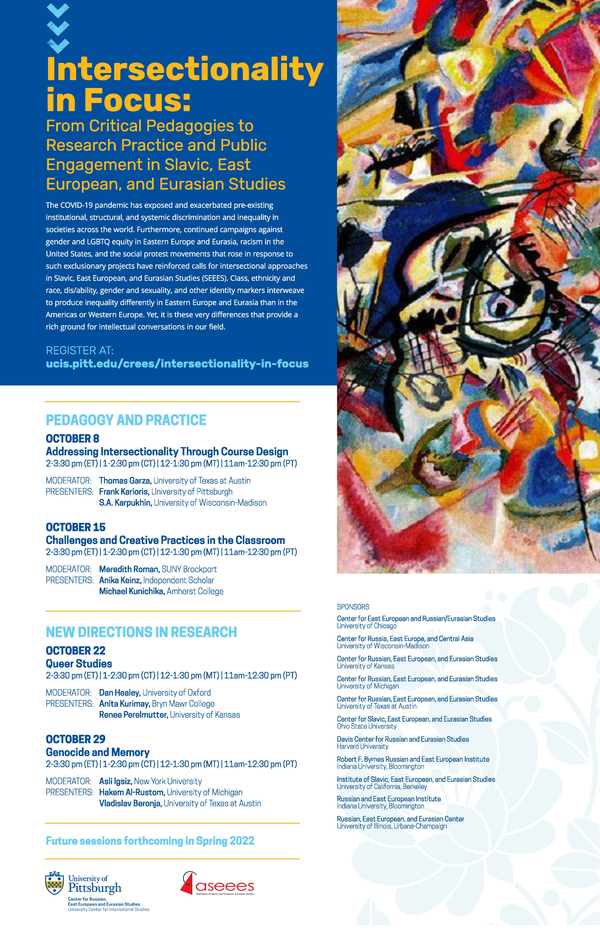
ASEEES - Pitt Intersectionality in Focus Series: "Queer Studies"
- Event Type
- Seminar/Symposium
- Sponsor
- Association for Slavic, East European, and Eurasian Studies Committee for Advocating for Diversity and Inclusion; University of Pittsburgh Center for Russian, East European, and Eurasian Studies; University of Chicago Center for East European and Russian/Eurasian Studies; University of Wisconsin Center for Russia, East Europe, and Central Asia; University of Kansas Center for Russian, East European, and Eurasian Studies; University of Michigan Center for Russian, East European, and Eurasian Studies; University of Texas Center for Russian, East European, and Eurasian Studies; Ohio State University Center for Slavic, East European, and Eurasian Studies; Harvard University Davis Center for Russian and Eurasian Studies; Indiana University Inner Asian and Uralic National Resource Center; University of California Institute of Slavic, East European, and Eurasian Studies; University of Illinois Russian, East European, and Eurasian Center; Indiana University Robert F. Byrnes Russian and East European Institute
- Virtual
- Join online
- Date
- Oct 22, 2021 1:00 - 2:30 pm
- Cost
- Free and open to the public.
- Registration
- Registration
- Contact
- REEEC
- reec@illinois.edu
- Views
- 65
- Originating Calendar
- Russian, E. European & Eurasian Center: Co-sponsored Events
Part of the online series, Intersectionality in Focus: From Critical Pedagogies to Research Practice and Public Engagement in Slavic, East European, and Eurasian Studies
The COVID-19 pandemic has exposed and exacerbated pre-existing institutional, structural, and systemic discrimination and inequality in societies across the world. Furthermore, continued campaigns against gender and LGBTQ equity in Eastern Europe and Eurasia, racism in the United States, and the social protest movements that rose in response to such exclusionary projects have reinforced calls for intersectional approaches in Slavic, East European, and Eurasian Studies (SEEES). Class, ethnicity and race, dis/ability, gender and sexuality, and other identity markers interweave to produce inequality differently in Eastern Europe and Eurasia than in the Americas or Western Europe. Yet, it is these very differences that provide a rich ground for intellectual conversations in our field.
NEW DIRECTIONS IN RESEARCH:
OCTOBER 22
Queer Studies
2-3:30 pm (ET) | 1-2:30 pm (CT) | 12-1:30 pm (MT) | 11am-12:30 pm (PT)MODERATOR:
Dan Healey is Professor of Modern Russian History at St Antony's College, University of Oxford. Professor Healey received a Ph.D. from the University of Toronto and is the author of several books on modern Russian History. He is currently researching for a book on the history of medicine in Stalin's Gulag camps. Prof. Healey's research has been concentrated on the history of sexualities and gender in modernizing Russia. He has written several books that explore homosexuality, masculinity, sexual disorders, and sexual violence in twentieth-century Russia. Prof. Healey's book, Homosexual Desire in Revolutionary Russia: The Regulation of Sexual and Gender Dissent (University of Chicago Press, 2001), is the first full-length study of same-sex love in any period of Russian or Soviet History and was awarded Honorable Mention for the Royal Historical Society's Gladstone History Book Prize.
PRESENTERS:
Anita Kurimay is Associate Professor of History at Bryn Mawr College. She received a Ph.D. from Rutgers University and specializes in modern European history emphasizing East-Central Europe. Dr. Kurimay's primary research interests include the history of sexuality, women's and gender history, conservativism, the history of human rights, and the history of sport. Her book, Queer Budapest, 1873-1961 (University of Chicago Press, 2020), examines the precarious coexistence between various illiberal Hungarian regimes and the queer community.
Renee Perelmutter is Associate Professor of Slavic Languages & Literatures and Jewish Studies at the University of Kansas. She received a Ph.D. from UC Berkeley and serves as the University of Kansas Director of Jewish Studies. Dr. Perelmutter's central teaching and research interests are Yiddish and Slavic morphosyntax and pragmatics, general and Jewish folklore, and Jewish culture. In addition, Dr. Perelmutter researches the construction of gendered practices and identities through multi-participant narratives. Her publications examine the social functions of non-cooperative and norm-disrupting behavior among Russian women in a virtual setting. Dr. Perelmutter is also a gifted linguist with a working knowledge of over 15 languages.